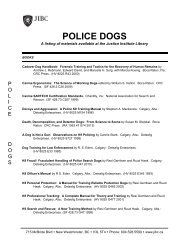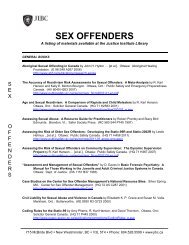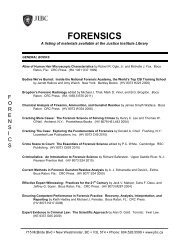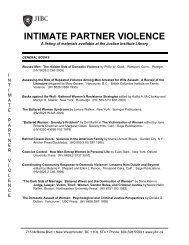legally speaking - Justice Institute of British Columbia
legally speaking - Justice Institute of British Columbia
legally speaking - Justice Institute of British Columbia
Create successful ePaper yourself
Turn your PDF publications into a flip-book with our unique Google optimized e-Paper software.
OFFICER SAFETY CONCERNS<br />
MUST BE MORE THAN<br />
GENERALIZED & NON-SPECIFIC<br />
R. v. Chuhaniuk, 2010 BCCA 403<br />
The police obtained a telewarrant<br />
authorizing them to search only the<br />
accused’s “residence” for evidence<br />
<strong>of</strong> electricity theft. The property was<br />
in a rural area, consisted <strong>of</strong> several<br />
a c r e s , a n d had several outbuildings located a<br />
considerable distance from the<br />
residence. A search team was<br />
assembled and during the briefing all<br />
<strong>of</strong>ficers were made aware that the<br />
warrant was limited to the residence.<br />
Some <strong>of</strong>ficers were instructed to go<br />
the front and back doors while others<br />
were tasked with securing the<br />
outbuildings. Upon their arrival at the<br />
property police used bolt cutters on a<br />
locked driveway gate. When police<br />
knocked at the residence an occupant<br />
answered the door. She was detained<br />
while the accused, located at the rear<br />
<strong>of</strong> the residence, was arrested. Other<br />
<strong>of</strong>ficers immediately approached<br />
outbuildings, not covered by the warrant, to allay<br />
their “safety concerns”. At a shed, an <strong>of</strong>ficer saw two<br />
electrical meters mounted at its front and smelled<br />
growing marihuana. He could not see inside<br />
because there were no windows and the doors were<br />
locked. He obtained a key from the occupant and<br />
opened the shed. He saw equipment sometimes<br />
used in the marihuana production.<br />
The <strong>of</strong>ficer then went to a garage on the property<br />
and again detected the odour <strong>of</strong> marihuana. He<br />
entered using a key and heard muffled voices<br />
coming from a small room where he found a radio<br />
playing. He saw a trap door, opened it, and found an<br />
underground bunker where he discovered a<br />
marihuana grow-operation. A second <strong>of</strong>ficer<br />
checked a summer house by walking around it and<br />
looking through the windows. He heard music<br />
coming from its basement, announced his presence,<br />
and entered, detecting a strong odour <strong>of</strong><br />
marihuana. No one was inside but the <strong>of</strong>ficer<br />
Volume 11 Issue 1 - January/February 2011<br />
PAGE 38<br />
noticed marihuana and paraphernalia associated<br />
with marihuana production. Following the discovery<br />
<strong>of</strong> the grow-operation the accused and his wife were<br />
arrested for marihuana production and advised <strong>of</strong><br />
their rights. A second telewarrant under the<br />
Controlled Drugs and Substances Act (CDSA) was<br />
obtained now authorizing the police to search the<br />
“Residence and Outbuildings” on the property.<br />
Police located over 1,200 marihuana plants and<br />
growing equipment such as lights, timers, air filters,<br />
and fans in the bunker, and 170 marihuana plants,<br />
bags <strong>of</strong> marihuana, $14,000 in cash, and various<br />
documents from the summer<br />
house.<br />
“[I]f police <strong>of</strong>ficers have<br />
reasonable grounds to be<br />
At trial in <strong>British</strong> <strong>Columbia</strong><br />
Supreme Court the accused<br />
argued that police lacked<br />
authority to approach and enter<br />
the outbuildings without a<br />
warrant, breaching his s. 8<br />
Charter right to be free from<br />
unreasonable search and<br />
seizure in doing so. He further<br />
contended that the evidence<br />
seized from the outbuildings<br />
after the second warrant was<br />
obtained should have been<br />
excluded. The Crown, on the other hand, submitted<br />
that there had been no s. 8 breach because the<br />
police were acting under the exigent circumstances<br />
exception found in s. 11(7) <strong>of</strong> the CDSA and <strong>of</strong>ficersafety<br />
concerns justified the warrantless entry <strong>of</strong> the<br />
outbuildings.<br />
concerned that there is a<br />
possibility that someone<br />
who poses an immediate risk<br />
to their safety or the safety<br />
<strong>of</strong> others is in such other<br />
place or premises, then they<br />
can take reasonable steps<br />
to minimize that risk.”<br />
The judge found the initial warrant only authorized a<br />
search <strong>of</strong> the main residence on the property, not the<br />
outbuildings. He acknowledged that the need for the<br />
police to discharge their duties safely could give rise<br />
to exigent circumstances, but in this case there were<br />
none that would justify the warrantless entries <strong>of</strong> the<br />
outbuildings. After considering s. 24(2) <strong>of</strong> the<br />
Charter the judge admitted the evidence <strong>of</strong> the grow<br />
operation in the bunker but the marihuana, cash,<br />
and documents seized from the summer house were<br />
excluded. The accused was convicted <strong>of</strong> producing<br />
marihuana and possessing marihuana for the<br />
purpose <strong>of</strong> trafficking. He was sentenced to a year in<br />
jail.






